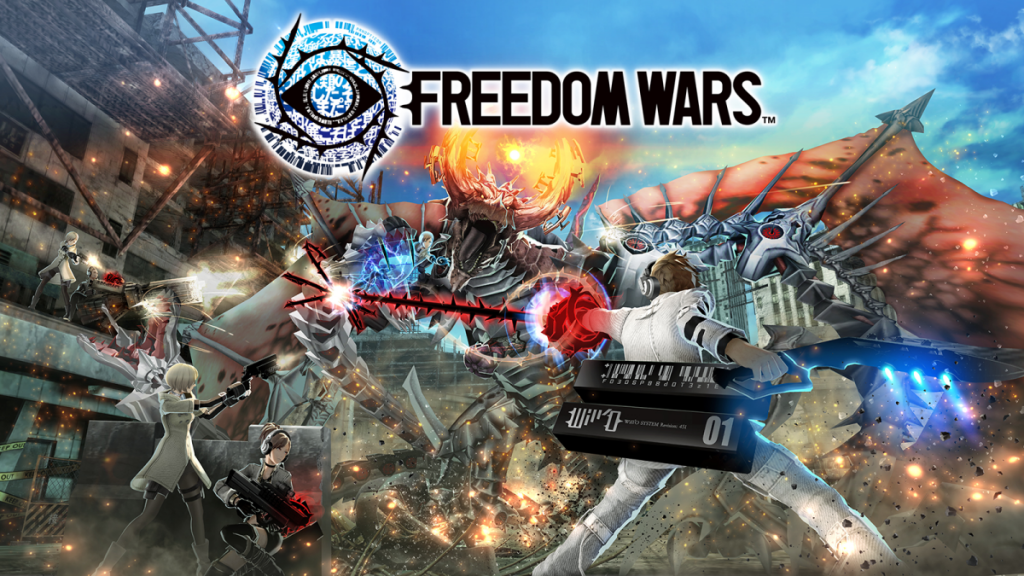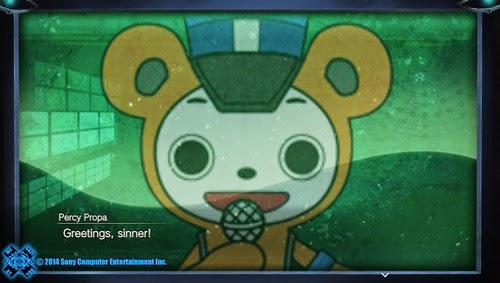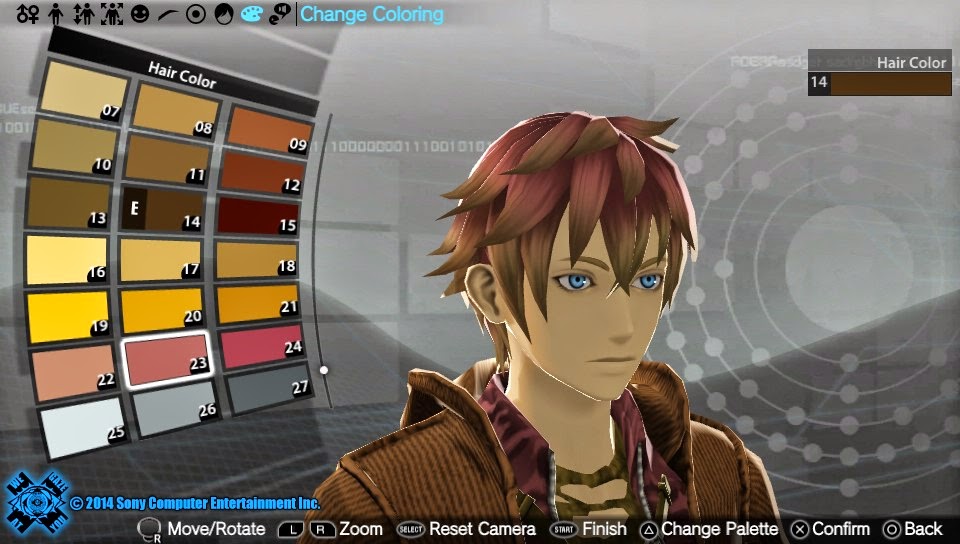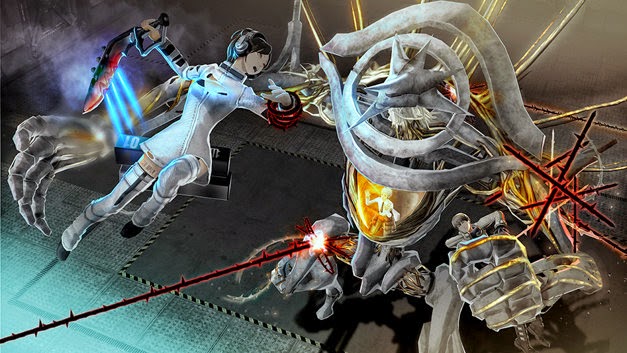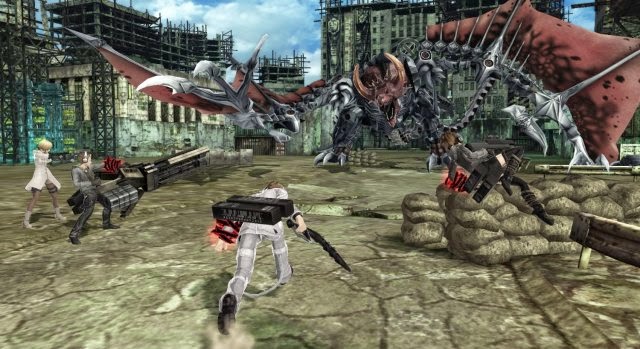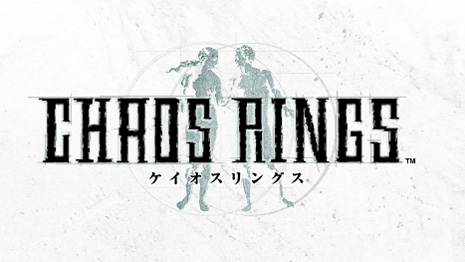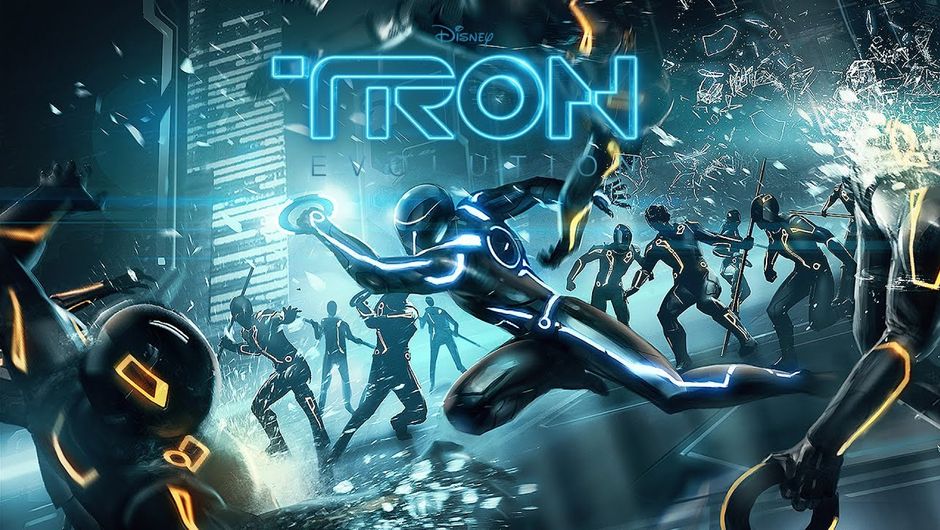After a long season of silence and dismissal, Sony has finally kicked the Playstation Vita back into high-gear thanks to the release of the Playstation TV—a mini-home-console-slash-streaming-box variant of the system—and the development efforts of Sony-owned Japan Studio, the same that graced us with Gravity Rush a couple of years ago. While it may be too early to call the Vita’s future secure just yet Sony is at least making another effort, and spearheading the charge is none other than the hotly-anticipated Freedom Wars. Originally planned as a PS3/PS4 title called ‘Panopticon’, Freedom Wars is a 3rd-person action/shooter game in the style of Monster Hunter, but with enough twists of its own to make it stand out as much more than just a clone of a popular genre. But is it the killer app Vita owners have been hoping for? Let’s find out.
For the Greater Good
Freedom Wars follows a mostly silent protagonist who is a member of a society called a Panopticon where natural resources are so scarce that it is considered a capitol offense simply to exist. The punishment for this crime? A 1,000,000 year sentence in prison, and that sentence can be added to simply by walking more than 5 steps in your cell, lying down to sleep, or attempting to carry on idle chat with your AI companion to pass the time. You can, however, still contribute to society in a variety of ways, particularly by going out and doing battle with other Panopticons to secure valuable resources, thereby reducing your sentence little by little and earning more and more privileges (called ‘entitlements’) until eventually that number hits 0. It’s a bit of an absurd premise, and the first couple of times you’re slapped with a sentence extension you may even grin at your judgments for their ludicrousness. However, the story doesn’t leave you disconnected so easily. Thanks to some clever writing and in-game details to really sell the plot, before long you won’t find the sentences so funny. For example, for each extension, reduction, or entitlement you receive, you must sign a document…with your fingerprint (simulated on the Vita’s touch screen). It’s things like this that really ground the player in the experience, feeling the weight of each punishment and the hope of each potential reduction and entitlement. In fact, much of the game’s charm comes from constantly building on its dystopian setting at every turn, even utilizing the Panopticon concept as a leaderboard of sorts, tallying up every player’s contributions as an overall GDP (called GPP in-game). There are 50 Panopticons to choose from when you first create your character, all based on major cities around the world, though they bear no ties to your actual physical location. All the same, Sony discourages switching allegiances by requiring a $2 fee for the service of doing so, meaning players will be more inclined to contribute more to their chosen Panopticon to raise its global ranking rather than simply jump ship to a Panopticon that’s already doing well. Which is, incidentally enough, exactly what your character is tasked with doing in Freedom Wars’ overarching narrative.
Simply put: Freedom Wars does a terrific job at making you feel like a part of its slightly absurd universe. Seriously, I felt like I owned the world when I earned the Entitlement to run for more than 10 seconds without being slapped with a sentence extension—nevermind how I might take this and many other ‘rights’ for granted in reality. What’s more, I was genuinely appreciative of my passive-aggressive government (affectionately self-titled “The Greater Good”) for bestowing the right upon a wasteful resource like me. No kidding—that’s how the game refers to you. You’re a sinner, the scum of the earth, and it makes a special effort to remind you of it frequently.
From Sinner to Citizen
But hang on to your self-esteem, because the story doesn’t end there. While it doesn’t walk you through working off all 1,000,000 years of your sentence—not even close, in fact—it does consistently find interesting ways to exploit the setting and simultaneously develop it as you explore and learn about Panopticon culture and society. All the voice acting is done in Japanese, but the English subtitles are impeccably translated and the original voice actors are more than good enough for their parts. Freedom Wars may not win any awards for its plot, but it’s certainly more substantial than any Monster Hunter game to date, and after enduring a bit of a slow start will definitely keep you coming back for more.
If nothing else, there’s always that loot lust to keep you motivated. Freedom Wars offers a very impressive level of character customization, from weapon loadouts to aesthetics to ‘augmentations’ that boost certain stats and help you focus on your preferred play style. You’ll quickly amass your own private dump of junk from completing missions, too—resources that can either be donated to your Panopticon in exchange for a marginal reduction of your million-year sentence or manufactured into something useful. It also doesn’t hurt that all this works towards crafting some of the best-looking character models on the Playstation Vita. You get the privilege of fully designing two of them—one sinner and one Accessory—and these can be fully remade at any time or just tweaked for new clothing, color, and decoration choices. So you can forget about the standard orange duds—for a game that drops you in a prison cell from the start, it certainly offers a lot of freedom in your personal look.
But beneath all that this is a hunting RPG, after all, first and foremost, though you might not realize it without prior experience in the genre. Missions take several different forms, but wherever enemies are involved you won’t be spending very long searching for them. Maps are generally adequately large and visually impressive, but all are walled arenas—there’s no chasing wounded enemies from zone to zone as they try to recover. But don’t get the wrong impression: Freedom Wars simply doesn’t get its thrills in sheer scale. It’s a relatively fast-paced game that is just a bit more deliberate than most. In addition to fully-customizable loadouts consisting of two main weapons of various fighting styles and a number of different utilities, each player is equipped with a grappling hook-type device called a Thorn. This can be used for offense, defense, or healing according to your preferred role, but whichever function you choose, the Thorn’s primary purpose is to help you zip around the map and latch on to enemies. There’s a bit of a learning curve to the Thorn, and the default control scheme may not be the most comfortable to you, but thankfully there are multiple schemes to choose from and plenty of opportunities to practice your skills before things get tougher or you take to the internet to team up with friends or compete against them. As an added bonus, if you are particularly struggling with a given mission and have friends in high places that can help complete it with/for you, you will receive an in-game ticket allowing you to skip the mission entirely in offline mode.
Not that I recommend it—every mission is an opportunity to hone your skills, reduce your sentence, and most of all, they’re just plain fun. Enemies don’t come down easily, and it’s very satisfying to slice away at them, collect their loot, and come out the hard-won victor.
However, Freedom Wars’s greatest strength also turns out to be its one central weakness (though not a critical one). As terrific as this half-arena shooter, half-hunting RPG mix usually is, there are some cases where the genres do not line up quite as well as Sony might have hoped. For one, the arena shooter aspect lends itself to repetition. There’s not a tremendous variety of enemies, maps, or game modes, and for arena shooters there doesn’t need to be, but as a hunting RPG this repetition does seem to emerge a bit more painfully. For another, in-game shops offer unlockable weapons and gear much like you’d expect of modern multiplayer arena shooters, but as a hunting RPG these shops are almost instantly obsolete as you collect better items by just looting your foes or synthesizing them yourself via the game’s Facilities system. Granted, these are the kinds of issues common to all new IPs, and all things considered, Freedom Wars has fewer of them than average. Sony got a lot right, but should there ever be a Freedom Wars 2 the formula still has ways it can be enriched.
A Valuable Resource
Freedom Wars is one of those titles that was hard to know what to expect of at first. The original trailer came a bit out of the blue and showed off a very unique world that we knew next to nothing about except that it looked cool. As story details came out and Japan got the game first earlier this year, expectations mounted and gamers placed their hopes in it as the Vita’s savior.
Is it? Maybe. Could it be? Almost. Freedom Wars pulls from other genres to create an experience very much its own, but in order to appreciate it gamers will have to look past both hunting RPG and third-person arena shooter conventions to appreciate Freedom Wars for what it is. It’s a unique mix of several genres with its own creativity thrown in and is easily capable of providing many hours of enjoyment, but the world it lives in is far more unique than it is vast. At its best the game is a blast, particularly when teaming up online with friends and strangers, but without more maps and enemies to conquer, its longevity is questionable. However, at an entry point of just $30 for a AAA-class title you can’t go wrong. Freedom Wars may not offer a million years of enjoyment, but for however long it does take for you to exhaust all it has to offer (which I guarantee won’t be less than 40 hours and probably will be much more) you’ll hardly be able to put your Vita down or get its surprisingly good soundtrack out of your head. It’s an instant Vita classic that, despite common new-IP flaws, definitely should not be missed.


